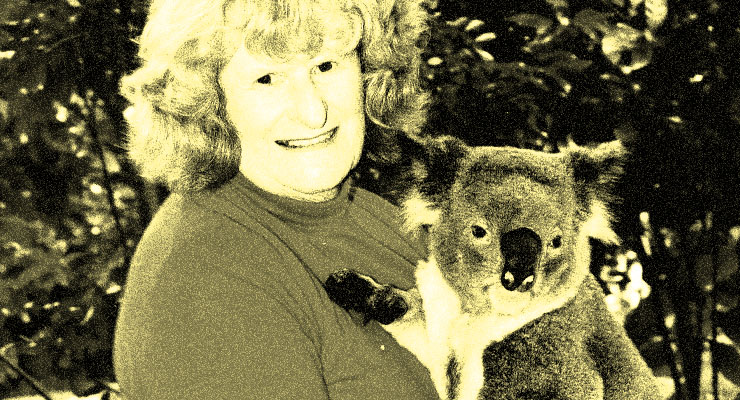
This article is part nine in a series. For the full series, go here.
Some readers may find aspects of this article distressing.
Doug Young and Lynette Marmin have been together for more than 40 years. She was a court recorder with a phenomenal typing speed and he is a retired mechanic. Marmin has a keen interest in vintage cars, drives a restored turquoise Datsun 120Y and is part of a motor club. The pair both have wild grey hair, have no children and live in greater Brisbane.
Marmin was under a guardianship order for two years. But Crikey can use their real names after the guardianship was revoked following a lengthy court battle and a public appearance by Young at a Queensland parliamentary committee, where he detailed her treatment.
Although guardianship orders are reviewed every 12 months to three years and can lapse, having one revoked is very rare. Lawyers say there have been just a handful of successful appeals in each state (though state tribunals contacted by Crikey were unable to provide data). Legal representation in guardianship tribunal hearings is also rare, and parties have to apply for leave to be granted representation.
On October 27, 2014, 70-year-old Marmin suffered a brain haemorrhage at home. Young was out of town but was worried after speaking to Marmin on the phone and hearing her words were jumbled. He called an ambulance from a separate phone and kept Marmin talking.
She was rushed to the Royal Brisbane Hospital where doctors confirmed she had suffered a stroke, and diagnosed her with aphasia, meaning she struggled to speak, read, write and had difficulty comprehending what was being said to her. Marmin still struggles to speak over the phone and could not be interviewed by Crikey, but confirmed via email she was happy for her story to be reported.
Less than three months into her recovery, a doctor compiled a medical report assessing Marmin as requiring assistance with complex decisions and on a request from her sisters referred her to the tribunal to be assessed for a guardianship order.
The public trustee took over Marmin’s finances and the public guardian took control over who could visit and contact her. Young was still her health appointee, meaning he managed her medical care. Young and lawyers involved in the matter contacted by Crikey say the aphasia didn’t affect Marmin’s intelligence.
The hospital did not respond to Crikey’s request for comment.

Nine months later, as she recovered from her stroke, Marmin applied to have her capacity reassessed to revoke the guardianship order. This process ended up taking more than two years. Young told a Queensland parliamentary inquiry the state charged Marmin $100,000 in fees — virtually her whole life savings — across the two years. The public trustee attempted to take financial control over her house, worth $400,000, and her superannuation, worth $600,000.
Young got external assessments on Marmin’s capacity and submitted them to the tribunal. He says he had more than 40 assessments from eight experts which showed that aside from some language and communication difficulties, Marmin had full capacity for decision-making.
The guardianship order was revoked on May 10, 2017.
Young complained the public trustee had committed fraud, and contacted the police, the attorney-general and the Crime and Corruption Commission Queensland, but his complaints were dismissed.
Punitive aspect to challenges
When someone is under financial administration, the public trustee decides how they spend their money, which can include refusing access to their funds to pay for lawyers. Lawyers who are either paid for by the family or work without accepting upfront costs can then apply to the court for special permission for the person’s funds to be used.
Young tells Crikey the public trustee refused to allow Marmin to spend her own money on legal representation, meaning he had to cover the cost of fighting the case. He estimates he spent about $13,000.
Former Queensland public advocate Mary Burgess tells Crikey some people felt challenges to the orders led to punitive measures by the public trustee.
“There are often very significant legal fees that are applied to people,” she said. “This often occurs because the person challenges a decision of the public trustee [in the tribunal] where the public trustee’s own lawyers appear and argue against the person under administration, and then the person is charged fees for its legal costs.
“Many administration clients view this as a penalty. If you rock the boat, you have more and more money removed from your account in fees for services that were not provided for your benefit.”
Standards for evidence and power dynamics skewed
Importantly, courts are not tribunals and the same rules of evidence usually do not apply. Opposing parties can test evidence in the tribunal — but only if they’re a party to the proceedings. Many families Crikey spoke to weren’t.
In New South Wales across 2019-20, 18.4% of all applications at its civil and administrative tribunal related to guardianship, an increase of 9.7% from the previous year. People have to apply with the tribunal to be granted legal representation. In Queensland, there was a 7% increase in guardianship hearings from last year, with nearly 14,000 applications lodged.
The lack of legal representation in tribunals is supposed to encourage mediation and reduce costs — but it also presents a massive imbalance of power, says Professor emeritus at Sydney University law school Terry Carney. He tells Crikey that lawyers or representatives of the public guardian and trustee have the upper hand and know how the system works.
Tribunals generally don’t award costs, meaning those under guardianship order would not be reimbursed for their legal fees if the order was revoked.
“There have been a number of inappropriate orders made … and there’s not a huge amount of time the tribunal can devote to any one case,” Carney said.
Although those under guardianship orders can wait for the order to lapse or be reviewed, getting a reassessment to prove a person has capacity can be tough, chief executive officer for Aged and Disability Advocacy Australia Geoff Rowe tells Crikey.
“Many states have hundreds of people waiting on their assessment list, and if someone has a roof over their head they’re not considered a priority,” he said.

It’s rarely clear-cut
One lawyer who represented Marmin, who asked to remain anonymous due to concerns around breaching court rules, tells Crikey it was one of the strongest cases against a guardianship order they had seen because of the mental health assessments Young had sourced, adding the Queensland public trustee had breached its fiduciary duty to Marmin.
“She had a brilliant case, she just wasn’t able to articulate [her thoughts] but had complete capacity on the inside,” one lawyer said.
Marmin was ecstatic once the order was revoked, he said: “She had the weight of the world lifted off her shoulders.”
To read more pieces in this series, go here.
For legal reasons, please don’t identify yourself or others under guardianship or financial administration in the comments.








Can you please tell me who I can contact re a trustee order that was done illegally in Tasmania..the woman is also under gaurdianship..
A great and important, although also profoundly disturbing, series of articles. See also the damning judgment of one of Western Australia’s most respected judges in S v State Administrative Tribunal of Western Australia (No 2) [2012] WASC 306